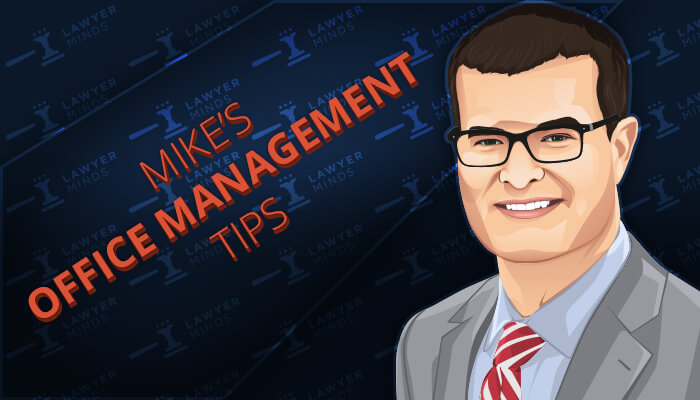Tax Reduction Strategies for Attorneys

To run a successful law firm– whether it’s a solo practice or a large firm– you’ll need to not only excel in the areas of law you’re practicing in, but also in all matters of running the practice itself. Running a legal practice comes with its own, unique set of challenges that even the most prepared lawyer setting out to start a new practice may find themselves overwhelmed with. I’m here to help make the job of running your law office just a little easier. Welcome back to Mike’s Office Management Tips.
— Mike Campbell
Taxes have to be paid. There’s no way around that. But they can hinder your ability to create wealth and grow your law firm. With the federal tax system structured the way it is, it’s important to know how to take advantage of the opportunities to save on taxes.
You may not realize it, but taxes are likely your single largest expense. If you take a look at just how much you pay in taxes, you’ll definitely be motivated to take action to reduce that amount. There are tax incentives built into the tax code by the government, which should give you more than enough encouragement to learn about tax reduction strategies.
Common Expenses Lawyers Can Deduct
The more deductions you can claim on your taxes, the better. There are a number of common expenses law firms can deduct, including:
- Meals. If you’re not deducting clients’ meals, you should be. You can deduct 50% of the meals and expenses you accrue during meetings to network with clients. To do this, you’ll need to keep detailed notes of who the meal or outing was with, what was discussed, and receipts for occasions. In the event the IRS conducts an audit of your law firm, you’ll have the information you need.
- Home Office. Whether you now work at home because of the COVID-19 pandemic or you’ve always had a home office, you can optimize your home office deduction. This allows you to deduct a percentage of your home expenses, like mortgage interest, rent, and utilities. The biggest roadblock to qualifying for this deduction is that you must use a portion of your home exclusively and regularly for business. This means the office is a separate room or is partitioned from another area. In addition to that, the home office must be the principal location of your business and you have to regularly meet with clients there.
- Traveling. Whether you’re traveling to attend a seminar for continuing education or are traveling to a client that cannot meet you in person, your travel expenses are fully deductible. In most cases, unless you hire your spouse or child, travel costs for family members are not deductible.
While those are the most common deductions for attorneys, that’s not where the list stops. Other potential deductions include equipment, professional fees, continuing education, health insurance, internet service, email services, professional association dues, and more. Make sure you check with your tax professional to make the most of your deductions.
Understanding Section 179
Section 179 of the IRS tax code allows law firm owners to deduct the full purchase price of any qualifying equipment or software bought during the tax year. Items must meet three qualifications, including the property being tangible, the property having been acquired for business use, and the property having been purchased by the owner.
It’s important to note that Section 179 is made on an item-by-item basis for eligible property. This means that you do not have to elect the full depreciation on all eligible property purchased during the fiscal year.
The Importance of Having a Proactive Accountant
As attorneys, we wear many hats. From firm visionaries to chief compliance officers, we need to be on top of our game to ensure our firms’ success. Accounting and taxes are complicated and change regularly. Instead of burdening yourself with the task of managing your firm’s accounting records, look into working with a proactive accountant.
Proactive accountant firms understand how frustrating tax time can be, which is why they help attorneys identify tax-saving opportunities throughout that year that are personalized. When you outsource your accountant, you can spend more time practicing law and providing your clients with top-notch legal representation.
If you’re looking to save money on your taxes, it’s important to understand how deductions work and what your firm is eligible for. That, however, isn’t where the tax savings stops. Your accountant should be able to help you save money when it comes to retirement planning, health reimbursement arrangements, and more.
Tax laws are always subject to change. This article is not meant as legal advice for you or your business. Please consult a tax professional for tax advice.


